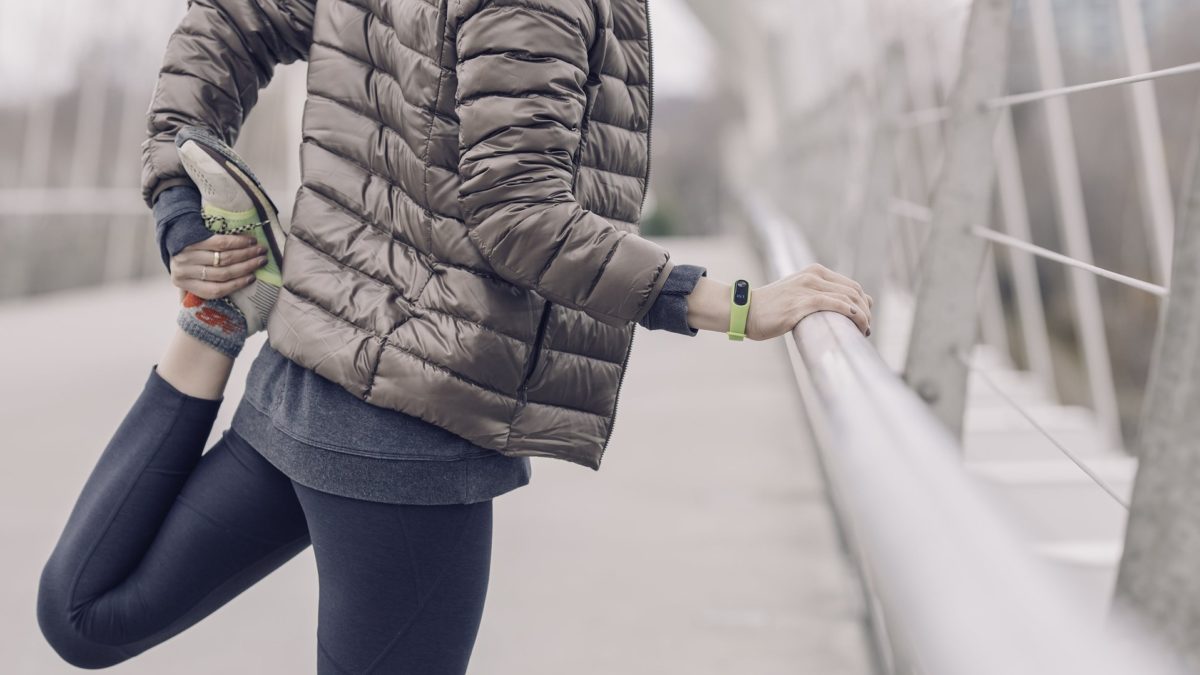Fitness trackers are by far the most successful wearable device to come in the last decade. They’re comfortable, stylish to wear, and offer incredibly useful information about heart rate, activity levels, and exercise intensity for everyday people and high-intensity athletes alike.
We put some of the most popular fitness trackers through their paces to find the top ten best fitness trackers you can find.
Rankings
1. Fitbit Charge 4
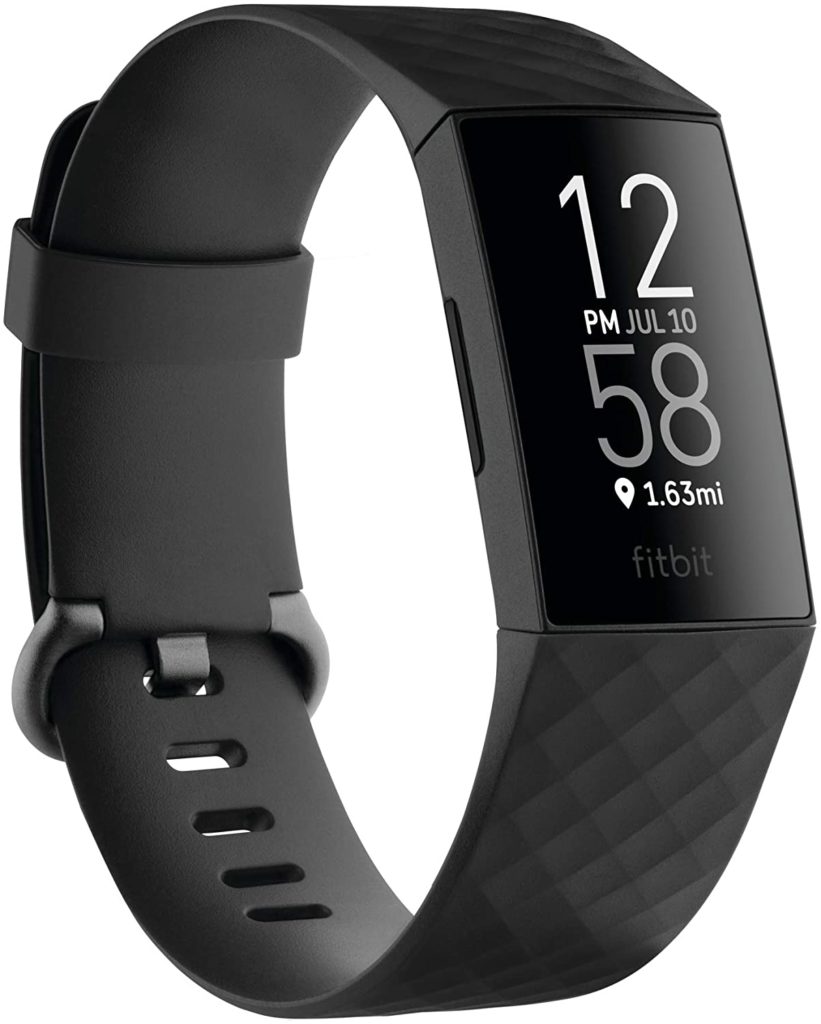
Fitbit is a name anyone in the fitness world will immediately recognize. They put the fitness tracker on the map and have continued to produce the best and most advanced fitness trackers for the modern athlete. Charge 4 is their flagship fitness tracker offering, packing tons of useful features into a tiny and stylish band comfortable enough to wear 24/7.
Why we like it: Charge 4 combines all the most in-demand features for a fitness tracker into a comfortable package. It has GPS based multisport tracking, the ability to accurately measure heart rate, effective sleep tracking, and much more. We especially loved the advanced algorithms and analysis it provides. The Activity Zone Minutes feature in particular gives you a telling glance at just how active you are during your day to day life.
Flaws: The only real quibbles we have with the Charge 4 are stylistic. The tracker’s actual look is almost identical to the previous generation’s Charge 3, and the screen is a monochrome black and white. It still looks remarkably sharp and performs beautifully, but some people may dislike its ‘basicness’.
2. Garmin Vivosmart 4

The Garmin Vivosmart 4 is the most consumer-focused offering in the company’s line of sports watches and trackers for high-intensity athletes. It focuses more on the fundamentals of fitness than the nitty-gritty details needed by elite athletes looking to push themselves to the limits of athletic achievement. Size, battery life, and style compare favorably to its closest competitors, while a few of the uniquely Garmin features it contains make it a strong contender for best overall fitness tracker.
Why we like it: It’s light, it’s comfortable, and it comes in a variety of gorgeous colors. It has all the essentials of a high-quality fitness tracker, including heartbeat monitoring, sleep tracking, multi-sport settings, and step counting, while still looking like a cute accessory. Garmin’s Body Battery almost deserves an article on its own, given how advanced and unmatched it is by other fitness trackers. After some calibration and analysis of how your body functions, the Body Battery can tell you the optimal points in your day to workout.
Flaws: No GPS. For a fitness band made by a company famous for GPS systems it was surprising that the Vivosmart 4 lacked one. We understand why they chose to leave it out of their most consumer-friendly fitness tracker, but it does knock the Vivosmart 4 down from the very top spot.
3. Fitbit Charge 3
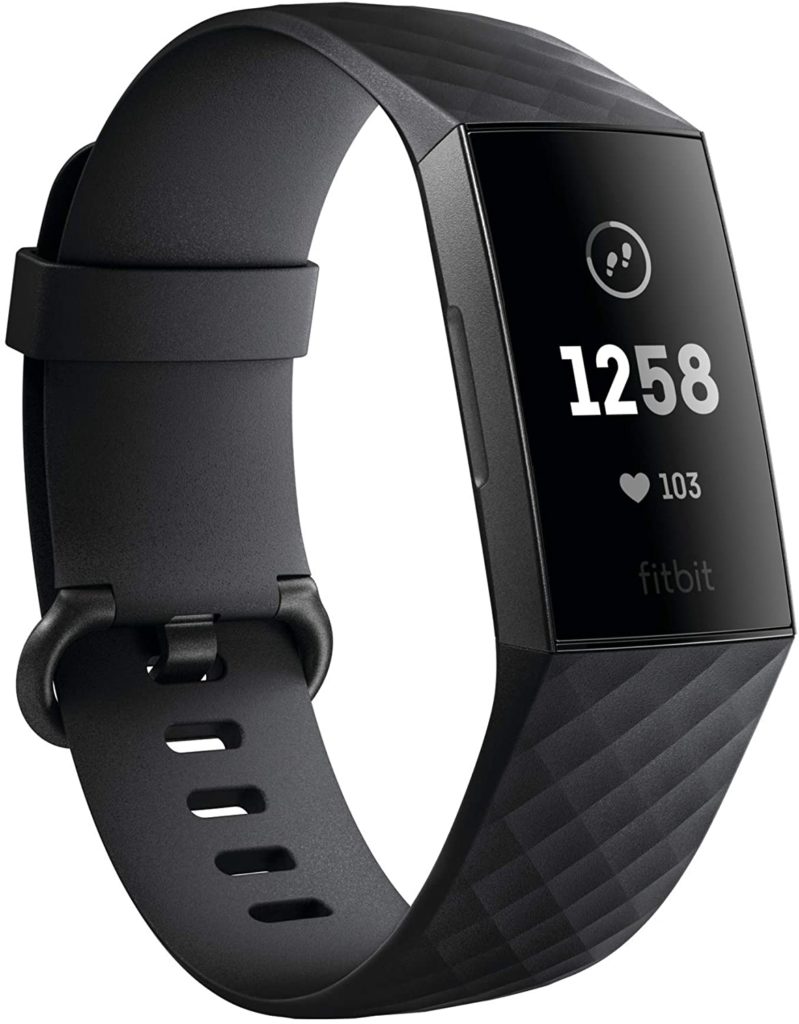
Wait, didn’t we already put a Fitbit Charge on this list? If you think that, you’d be right, the Charge 4 is the latest flagship fitness tracker from Fitbit, but there’s still a strong argument for the Charge 3. It has 90% of the features of the Charge 4, lacking only GPS and FitPay functionality, yet costs substantially less.
Why we like it: It’s got everything that the Charge 4 does, minus GPS, for a noticeably lower price. It’s just as stylish, has the same grayscale display, battery life, waterproofing, and durability. If you aren’t a high-intensity athlete and just want the basic fitness/sleep tracking features there’s a compelling argument to be made for the Charge 3.
Flaws: The lack of GPS is the most noticeable. It makes the sport modes slightly less accurate and generally reduces functionality for elite athletes. FitPay is also a nice feature to have, but it isn’t what we’d call essential.
4. Fitbit Ace 2

Fitness isn’t only for grownups. The Fitbit Ace 2 provides the same exceptional fitness and sleep tracking metrics in a form factor designed to comfortably fit children’s wrists. Kids love gadgets, and a cool fitness tracker is a great way to build an early interest in health and fitness.
Why we like it: The Ace 2 was built specifically to comfortably fit on children as young as six while still being durable enough to handle everything a young child can throw at it. It’s made from durable materials with a shatter-resistant screen and is designed to slip out of its child-friendly housing as they grow and fit into more adult settings. It allows kids (and their parents) to track steps, sleep schedule, and things like active minutes. All of this for a very affordable price.
Flaws: It’s very, very basic. Let’s face it though, most kids don’t need to know their oxygen absorption rate or figure out how many calories they burned on a treadmill. We would have liked to see a heart rate monitor included, though.
5. Apple Watch Series 3
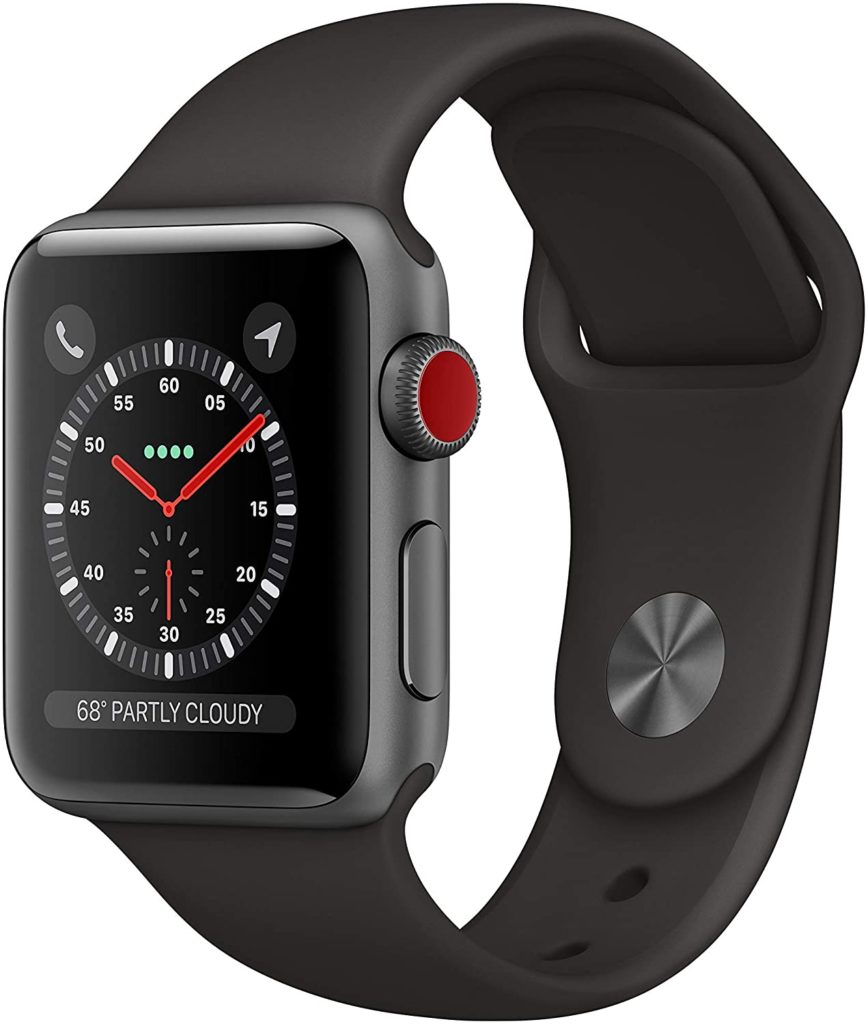
Check price on Amazon for GPS only or GPS+Cellular
The Apple Watch Series 3 is no longer the newest of the new Apple wearable, but it still has a lot to offer from a fitness tracking perspective. The principal upgrades from the Series 3 watches to the Series 5 watches were cosmetic. An always-on screen paired with an improved battery life through better processing control are great, but they don’t noticeably improve the usability of the Series 5 over the Series 3 for fitness purposes.
Why we like it: The Apple Watch Series 3 offers all the fitness tracking functionality of the newer and slightly larger Series 5 watch at a substantial discount. The only thing you lose out on is the always-on screen and a slightly shorter battery life. Other than that they’re functionally identical, providing all the same fitness and sleep tracking information in the same ways. The full GPS+Cellular version is noticeably less expensive than the same model Series 5, but the GPS only version is wildly cheaper.
Flaws: Despite its impressive list of features, the Series 3 is still a product released in 2017. It currently runs the newest iteration of Apple’s watchOS but there’s a very real chance it won’t receive the next one. If this is a concern you should consider a different tracker.
6. Huawei Band 4 Pro

The Huawei Band 4 Pro is the flagship fitness band offering from one of the biggest names in the smartphone world. It features some of the best specs you can find for fitness tracking at a price that’s hard to believe. When combined with powerful app support and advanced analytics it really shines.
Why we like it: For the price there’s no fitness tracker that can beat it. Where else can you find GPS tracking features, a gorgeous AMOLED display, and full waterproofing for less than half the price of other flagship fitness trackers. It even includes performance features like VO2max tracking, heart rate zone monitoring, and analytics that can recommend the optimal recovery time between workouts.
Flaws: Some users aren’t thrilled with the fit of the Huawei Band 4 Pro. It’s not quite as comfortable as otter flagship fitness trackers. The GPS also isn’t as quick to respond/update your position as some competitors.
7. AmazFit Bip

The AmazFit Bip is a low-cost smartwatch alternative for those who want an Apple Watch but can’t see dropping the cost of a new smartphone on one. It offers basic smartwatch features plus useful fitness tracking for those looking for the essentials only.
Why we like it: For a ‘generic’ product the Bip offers a lot of amazing features. It gives you many elements of a smartwatch plus the most important ones from a fitness tracker in a stylish body that looks a whole lot like a certain culture-rocking fruit company’s premier smartwatch. The fitness functions aren’t as advanced or flexible as those on other fitness trackers, but they still include GPS, heart rate monitoring, sleep tracking, etc. Where the Bip really shines is in battery life. You can run this bad boy for up to 45 days on basic tracking mode, way longer than its competitors.
Flaws: It’s basic, and we mean really basic. It ‘looks’ like a modern smartwatch, but offers features from two or even three generations back. That’s still a lot of functionality, but it certainly can’t compare to the seamless operation and highly advanced analytics of the best on the market.
8. Xiaomi Mi Band 5

The Xiaomi Mi Band 5 is the latest iteration of the popular Mi Band line of fitness trackers. It offers a long list of features for casual fitness enthusiasts and people trying to get more active in general.
Why we like it: On paper, the Mi Band 5 should be able to compete with the best fitness trackers in the world. It’s waterproof, monitors your heart rate, tracks your workouts and steps, gives you access to a range of notifications from your smartphone, and has an impressive two-week battery life. Of course, specs aren’t everything. It’s still a good fitness tracker at a very affordable price, but there are definitely better options.
Flaws: The Mi Band 5 is what you get when high-quality ingredients are put together almost perfectly. It works reasonably well and offers some useful information, but the lack of high-quality app support and surprisingly weak analytics holds it back from a place among the best fitness trackers.
9. Wyze Band
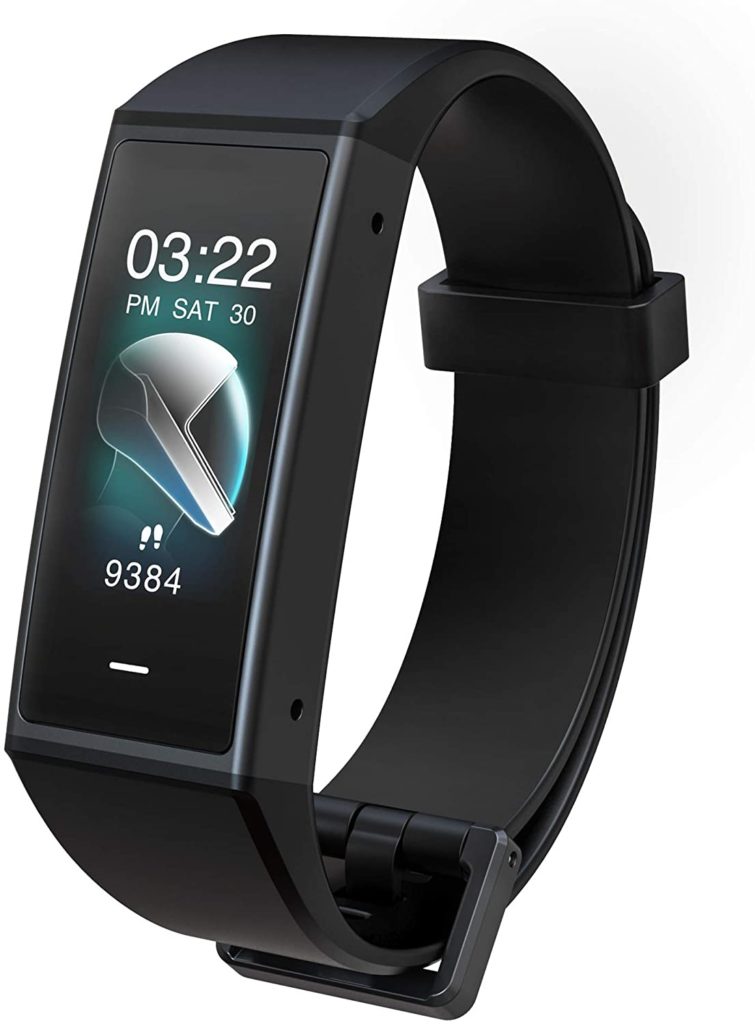
Wyze is a company better known for their security cameras than consumer electronics. Recently though, they’ve begun expanding their product lines to add surprisingly useful low-cost alternatives to in-demand gadgets such as fitness trackers and even light bulbs. The Wyze Band isn’t a high-end sport tracking fitness band, but it does give you all the most crucial fitness information and provide an accurate count of your steps and other key metrics.
Why we like it: Price, the Wyze Band is by far the least expensive fitness tracker available from a reputable brand. It offers the essential features needed from a fitness tracker, including step count and heartbeats per minute, and is both comfortable and reasonably stylish.
Flaws: This is very much a basic product. It doesn’t offer activity modes, have GPS support, show more than simple notifications, or even (currently) integrate with any useful apps. It tracks your steps, has a very basic run mode, measures your heartbeat, and tells you some sleep info, and that’s about it. For those looking for more advanced features, this isn’t the fitness tracker to go with.
10. Garmin Vivofit 4
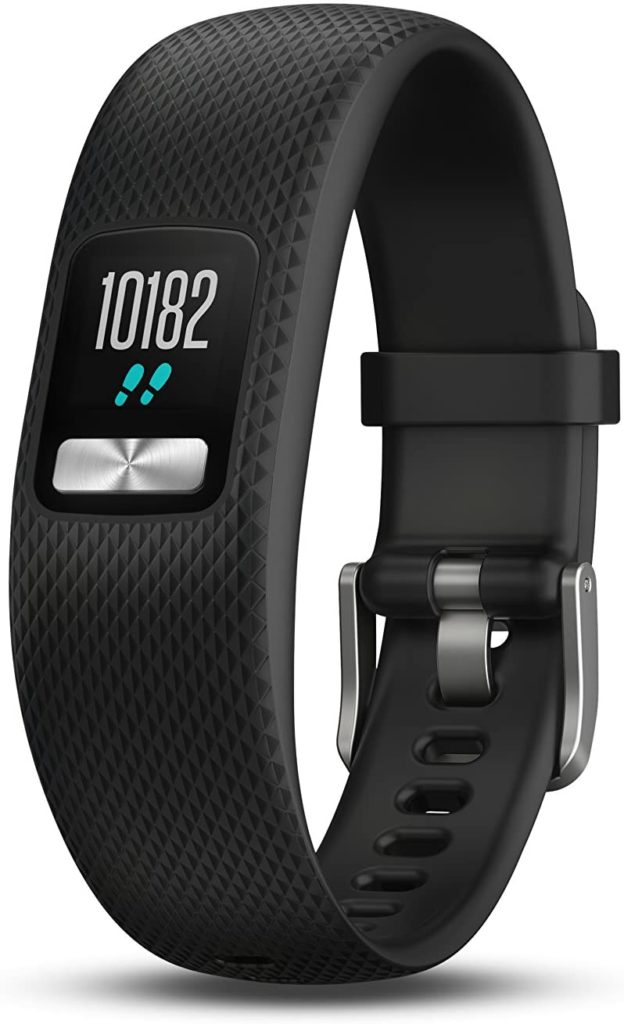
The Garmin Vivofit 4 is a stripped-down version of a fitness tracker that cuts the features and sensors to the bone. It lacks most of the metrics we’ve come to expect from top-of-the-line fitness trackers but still manages to make a compelling argument for its value.
Why we like it: The battery life is honestly insane. It comes fully charged for up to a year of use, unheard of for a fitness tracker. Add in the surprisingly capable information it can provide on steps, distance, and activity levels and you wind up with a lightweight fitness tracker that offers real value.
Flaws: The lack of GPS and heart rate monitoring really limits how much data it can give you. Garmin makes up for it with some very effective algorithmic workarounds, but it still can’t match the depth of information provided by a fully-loaded fitness tracker.
Who should buy a fitness tracker?
Fitness trackers aren’t for everyone, but the groups below can see substantial benefits from them.
People who’ve never exercised or dieted – If you’re a total novice to fitness and healthy eating a fitness tracker can be one of the best ways to get started. It gives you a baseline of your activity level and can act as a motivational tool.
If you can see exactly how many steps you’re taking every day it becomes a lot easier to add more. The same goes for your sleep and other metrics, just knowing where you’re at gives you a leg up.
People working to lose weight or get healthier – Losing weight is hard for a lot of people. One reason for this is how difficult it is to actually tell how active you really are and how many calories you’re burning.
A fitness tracker gives you the ability to measure your activity level accurately and can even send the information to your fitness apps.
Runners, marathoners, and other athletes – The most apparent user group for fitness trackers are those who exercise frequently. Runners and other athletes will find a wealth of useful data on their cardiovascular health and activity at their fingertips.
Swimmers – Swimming is one of the best activities you can perform, capable of improving both your cardiovascular and muscular strength. One thing that can be hard for new swimmers is figuring out just how hard they’re exercising while swimming (1).
Modern fitness trackers are mostly waterproof and fully capable of recording your heart rate and other key metrics while in the lap pool or even swimming in open water.
How we ranked
We used six key metrics to rank the trackers on our list. These were features and accuracy, style, battery life, display quality, durability and water resistance, and smart features and compatibility.
Features and accuracy – The available features and their accuracy really set the base floor for fitness tracker quality. The best trackers with GPS and multi-sport capability can provide you with highly accurate data about your activity in multiple activities. Even the most basic models should provide relatively precise heart rate, step, and sleep tracking information.
Style – Fitness trackers are designed for constant wear, usually on your wrist. For that reason style and a customizable aesthetic is a big deal. True training trackers can get away with basic color patterns, but the best fitness trackers need the ability to fit in with any wardrobe, in any setting.
Battery life – Battery life is going to vary wildly depending on the level of information and sensor type the tracker provides, but in general should be as long as possible. This can range from up to a month down to just a few days depending on the brightness, clarity, and functionality of the screen and especially on the type and complexity of the sensors under the hood.
GPS fitness trackers always have much lower battery lives than non-GPS models.
Display – Fitness trackers have tiny screens yet need to show dense information. They don’t need to be smartphone clear, but they do need to have an easy to use interface that shows you the information you want to see without difficulty.
Durability and water-resistance – Durability and water-resistance are the two key factors that determine the lifespan of a fitness tracker. They need to be able to handle every day wear plus at minimum the occasional splash or sudden rainstorm.
We ranked highly fitness trackers that took it a step further and were fully waterproof for use in all weather conditions and even swimming.
Smart features and compatibility – By far the most significant advance in fitness tracker usability has been the integration with existing smartphone apps, smart scales, etc, and the ability to take on limited smartwatch features.
Fitness and dieting apps are growing in popularity, having a fitness tracker that connects with them makes it much easier to monitor your health and training regimen.
FAQ
Q: How do fitness trackers work?
A: Fitness trackers combine several different sensors together with advanced software. They include things like 3-axis accelerometers to track movements, heart rate monitors to get your resting and active pulse, and an oximeter to measure blood oxygen levels (2).
Q: How do fitness trackers measure calories?
A: Fitness trackers provide an estimate of calorie burn based on detected movement, heart rate, and the information it knows about your body. It uses this to calculate your basal metabolic rate (BMR) and runs the exercise intensity level through additional algorithms to estimate calories burned. It’s not exact, but the best fitness trackers are getting more and more accurate (3).
Q: Are fitness trackers waterproof?
A: Some, yes, some no. All fitness trackers offer at least some level of water- and sweat-resistance, but not all are truly waterproof. If you want a fitness tracker for swimming, you need to spring for the waterproofing.
Our top pick for best waterproof fitness tracker, also our overall number one pick, is the Fitbit Charge 4.
Q: Can fitness trackers monitor blood pressure?
A: No. There have been a few wearables designed to record blood pressure, but there are no high-quality fitness trackers that can do so.
Q: How accurate are fitness trackers?
A: It depends on what type of accuracy you want. Step tracking relies on the movement of accelerometers and is generally very accurate for the best fitness trackers. Those with GPS sensors are also getting really good at recording distance walked/run and things like basic activity.
Heart rate, and especially calories burned, are a lot more questionable. Even the best heart rate sensors can be thrown off by rapid movement and sweat build-up, two things that pretty much always happen during intense exercise (4).
Q: Are fitness trackers safe to wear?
A: Currently, there are no medical studies that show any risk from wearing a fitness tracker. This may change, but at the moment, it appears that they’re safe to wear.
Q: How often should I replace my fitness tracker?
A: There’s no hard and fast rule for replacing fitness trackers like there is with replacing workout shoes (every three to six months, or when you hit 500 miles of wear). So long as they’re still charging and working, they should operate just fine (5).
The real reason to replace them is because of how much more advanced new models are getting. If you’re still using a first- or second-generation fitness tracker it’s a good idea to upgrade.
Recap
Fitness trackers are accurate, affordable, and provide valuable information about your activity level and workout intensity. They’re a great tool to help you improve your physical fitness levels.
For Hastings #1 fitness tracker recommendation, click here.
